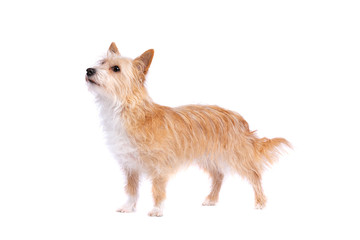Portuguese Podengo

Portuguese Podengo: The Agile and Alert Hunter
Welcome to the comprehensive guide on the Portuguese Podengo, a breed distinguished by its versatility, intelligence, and spirited nature. This page explores the Portuguese Podengo, a breed that excels in agility and companionship, offering a blend of lively character and loyal temperament.
Introduction Originating from Portugal, the Portuguese Podengo comes in three sizes: small (Pequeno), medium (Medio), and large (Grande), each with a unique role in hunting and as a family companion. This breed is known for its keen hunting abilities, social nature, and adaptable personality.
Overview
- Podengo Pequenos (Small):
- Height: Between 8 to 12 inches at the shoulder.
- Weight: Typically 9 to 13 pounds
- Podengo Medios (Medium):
- Height: Ranges from 16 to 22 inches at the shoulder.
- Weight: Usually around 35 to 44 pounds
- Podengo Grandes (Large):
- Height: Stands 22 to 28 inches tall.
- Weight: Varies from 44 to 66 pounds
Colors: black, chestnut, fawn, gold, gray, orange, red, yellow, white with another acceptable color
Life Expectancy: 12-15 years
Group: Hound Group
___________________________________________
Physical Characteristics
- Size and Build: The Portuguese Podengo varies in size from 8 to 28 inches and weighs between 35 to 66 pounds depending on the variety. They exhibit a well-proportioned, sturdy build suitable for their hunting background.
- Coat: The breed features either a smooth or wire-haired coat, which is seasonally shedding, requiring regular grooming to maintain its condition.
Temperament and Personality
- Lively and Playful: Portuguese Podengos are full of life, demonstrating playful and alert behavior, making them excellent companions for active households
- Intelligence and Independence: This breed is highly intelligent but can exhibit independence, which might pose a challenge in training. However, they are generally amenable to training by experienced dog handlers. Sociable and Protective: Podengos are social animals, thriving on interaction with their family. They are loving with family members but may be suspicious of strangers, making them good watchdogs.
Training and Exercise Needs
- Training Needs: While intelligent, their independent streak can make training a challenge. Consistent, positive reinforcement methods work best, and training should start early.
- Exercise Requirements: Given their energetic nature, Podengos require regular exercise to keep them physically and mentally stimulated. Activities like long walks, play sessions, and agility training are ideal.
Health and Longevity
- General Health: Portuguese Podengos are a hardy breed, typically maintaining good health throughout their lives. They have a lifespan of up to 14 years.
- Healthcare Needs: Regular veterinary check-ups are important to monitor their health, along with routine vaccinations and preventive care. Some problems that can affect the breed include allergies, epilepsy, patellar luxation, PRA, hip dysplasia. Dog Health Dictionary
Living with a Portuguese Podengo
- Family Life: They are well-suited for families, demonstrating friendliness and affection towards children and other pets.
- Adaptability: Podengos adapt well to various living environments. However, they thrive best in homes where they can have ample space to exercise.
- Companionship: Forming strong bonds with their owners, Podengos enjoy being involved in daily family activities and are known for their loyalty.
Responsible Ownership
- Choosing a Breeder: Prospective owners should select breeders who prioritize health, temperament, and adherence to breed standards.
- Consider Adoption: Adopting from shelters or breed-specific rescues offers a chance to provide a loving home to a Podengo in need.
.
Conclusion: The Portuguese Podengo, with its agility, intelligence, and affectionate nature, is an excellent breed for those seeking a lively and adaptable companion. Their varied sizes cater to different lifestyles, making them suitable for a wide range of homes.
Housebreaking
PUPPY HOUSEBREAKING tips: https://www.dog-breeds.net/puppy-housebreaking/
ADULT MARKING AND RETRAINING tips: https://www.dog-breeds.net/dog-housebreaking-marking-page/



